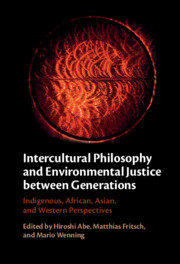 Intercultural Philosophy and Environmental Justice between Generations
Intercultural Philosophy and Environmental Justice between Generations from Part I - Indigenous Philosophies on Justice between Generations
Published online by Cambridge University Press: 14 March 2024
The chapter proposes a concept of justice for future people that is mindful of Indigenous critiques of the Anthropocene and associated climate horror scenarios. I first review these critiques, which suggest that motivating pro-futural care by dreading an impending climate crisis tends to betray a privileged, often settler-colonial perspective. On this basis, I then review various Indigenous accounts of intergenerational relations, in which I find one common idea in the claim that present generations owe to descendants in part because they received a gift from ancestors. I seek to model and defend this view and its social ontology (I call it “asymmetrical reciprocity”). I then seek to show how asymmetrical reciprocity can help to decolonize the future by disallowing a linear view of time according to which a focus on the future permits the neglect of the past. Hence, climate ethics and intergenerational justice must face the history of colonialism.
To save this book to your Kindle, first ensure [email protected] is added to your Approved Personal Document E-mail List under your Personal Document Settings on the Manage Your Content and Devices page of your Amazon account. Then enter the ‘name’ part of your Kindle email address below. Find out more about saving to your Kindle.
Note you can select to save to either the @free.kindle.com or @kindle.com variations. ‘@free.kindle.com’ emails are free but can only be saved to your device when it is connected to wi-fi. ‘@kindle.com’ emails can be delivered even when you are not connected to wi-fi, but note that service fees apply.
Find out more about the Kindle Personal Document Service.
To save content items to your account, please confirm that you agree to abide by our usage policies. If this is the first time you use this feature, you will be asked to authorise Cambridge Core to connect with your account. Find out more about saving content to Dropbox.
To save content items to your account, please confirm that you agree to abide by our usage policies. If this is the first time you use this feature, you will be asked to authorise Cambridge Core to connect with your account. Find out more about saving content to Google Drive.